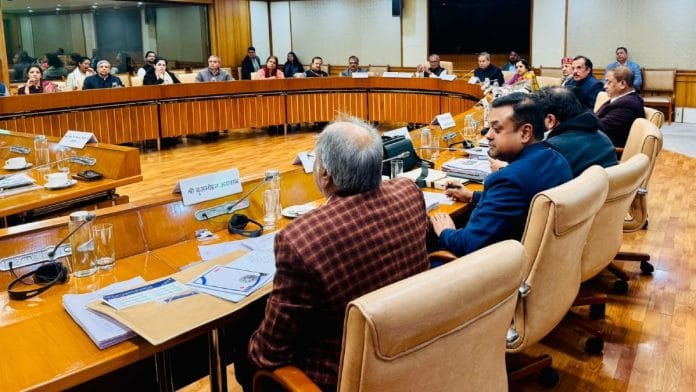New Delhi: A parliamentary panel, in its report tabled Tuesday, expressed concern over the draft Higher Education Commission of India (HECI) bill—which is yet to be introduced in Parliament—on the ground that it has a “central government-heavy composition” and “inadequate” representation from the states.
The parliamentary Standing Committee on Education, Women, Children, Youth and Sports headed by Congress Rajya Sabha MP Digvijaya Singh said removing state control could lead to closure of institutions in rural areas that suffer from infrastructure or faculty shortages.
“It would indirectly fuel privatization especially in rural areas,” the committee said in its report tabled in Rajya Sabha.
The HECI bill, which is still in the drafting stage, proposes one principal regulator for higher education, with four verticals: regulation, accreditation, funding, and academic standards. It will subsume higher education regulators such as the University Grants Commission (UGC) and the All India Council for Technical Education (AICTE). While the UGC oversees non-technical higher education, AICTE oversees technical education.
The education ministry had presented the draft HECI bill before the committee for discussion.
The parliamentary panel has observed that the current system of multiplicity of regulators leads to inconsistency in standards and monitoring, making it difficult for institutions to function effectively.
“…. the draft HECI bill, which seeks to replace UGC as a single regulator, appears to perpetuate many of these same issues by maintaining a central government-heavy composition and insufficient state representation,” the panel said in its report.
It said that state universities, which educate over 90 per cent of the student population, are caught in between national and state-level regulations. “The proposed HECI bill will hold significant power, including the ability to grant degree-awarding authority and close institutions failing to meet standards,” the committee pointed out.
The committee said this on the action taken by the government on the recommendations given by the panel in its earlier report titled ‘Review of Education Standards, Accreditation Process, Research, Examination Reforms and Academic Environment in Deemed/ Private Universities/other Higher Education Institutions’.
‘Simplified hierarchy of regulatory bodies’
The committee has recommended that a simplified hierarchy of regulatory bodies would be more effective, which will have a final say in implementation of government rules/regulations/acts etc.
“…the Department should ensure that any such unified regulatory body must have adequate representation for all states and there should not be excess centralization.”
While noting that the National Education Policy (NEP) 2020 envisages the creation of the HECI as the principal regulator for higher education, the parliamentary panel recommended that the aspects relating to “protection of interests of stakeholders, clear demarcation of its jurisdiction to avoid any regulatory overlaps and gaps, independent nature with adequacy of resources and performance accountability be given due consideration”.
It did not accept the response received from the government regarding its recommendation on these issues.
The draft HECI bill was first introduced in 2018 but was later withdrawn to incorporate recommendations of the NEP 2020. At that time, too, the draft bill was criticised for having a “centralised” approach.
There was a renewed push to make the HECI a reality after Dharmendra Pradhan took over as Union education minister in July 2021.
Bikash Ranjan Bhattacharyya, CPI(M) Rajya Sabha MP and a member of the parliamentary panel, told ThePrint, “The education ministry had presented the draft HECI bill before the committee for discussion. We reviewed it and submitted our concerns, as it goes against the federal structure of the country and encroaches on states’ authority.”
(Edited by Amrtansh Arora)
Also Read: How UGC’s new rating system for higher institutions sets stage for flashpoint with non-NDA states






